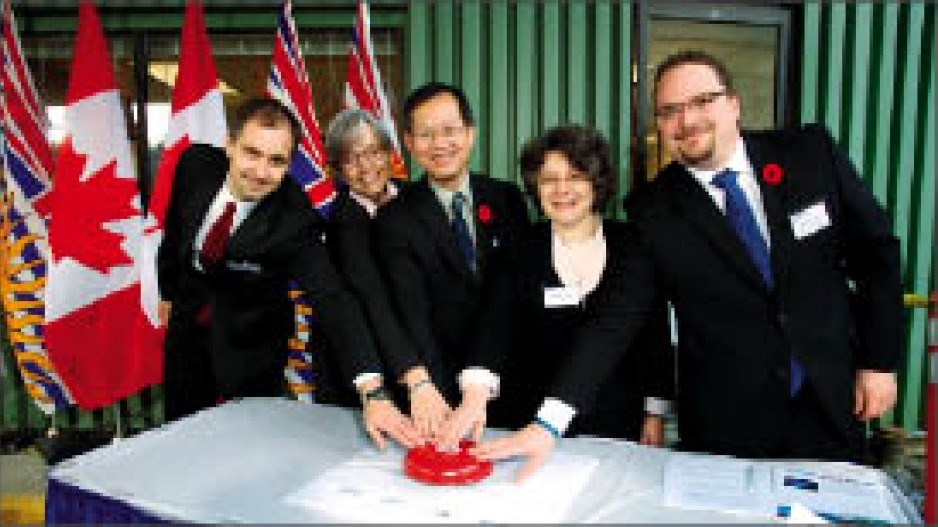Scott Construction Groupbuilds condos, office buildings, warehouses – even cathedrals.
Now it hopes to add one more area of construction expertise to its resume: subatomic particle accelerators.
The construction company is one of several local firms involved in the construction of the $62.9 million ARIEL (advanced rare isotope laboratory) at the TRIUMF subatomics physics lab.
Other local companies involved in the project include Chernoff Thompson Architects and Thurber Engineering.
Scott Construction has already built two buildings related to the ARIEL project and plans to bid on the contract for the main building that will house the accelerator – worth an estimated $15 million to $20 million – once bids are tendered.
?We?ve employed literally dozens of people,? said Darren Rae, Scott Construction?s vice-president of special projects.
The project was officially kicked off at a November 1 ground-breaking ceremony on the on University of British Columbia campus where TRIUMF lab is located. TRIUMF is owned and operated by a consortium of 17 Canadian universities.
The 18-month construction project will employ 300 workers and create 160 permanent spinoff jobs, according to the B.C. Ministry of Jobs, Tourism and Innovation. Already the project has provided Scott Construction with close to $2.5 million worth of work.
The new facility is slated for completion in the spring of 2013, although it will not be commissioned until 2014. Once in operation, it will provide rare radioactive isotopes for nuclear medicine and pure research.
Radioactive isotopes have two medical applications. Some are used in medical imaging (PET scans, for example). Therapy isotopes, meanwhile, can be used to target cancer cells with deadly precision.
TRIUMF is working with Richmond-based Advanced Cyclotron Systems Inc. (a subsidiary of EBCO Industries), which makes cyclotrons that hospitals use to make radioisotopes for medical imaging.
TRIUMF director Nigel Lockyer said scientists believe the ARIEL will be able to create new isotopes that would allow ACSI cyclotrons to produce isotopes for therapeutic uses.
?We would be able to modify their machines to produce these isotopes, so this would give [ACSI] a competitive advantage,? Lockyer said.
The B.C. government is contributing $30 million to the ARIEL project; the federal government will pick up most of the balance.
Other funding partners include the Variable Energy Cyclotron Centre in India, which is buying some of the same components that are being made for the ARIEL from Richmond?s Pavac Industries.
?This is really good for us because we can really demonstrate our capabilities,? said Pavac president Ralf Edinger.
The components Pavac makes – donut-shaped superconducting radio frequency cavities made of niobium – will be used in ARIEL?s e-linac underground particle accelerator.
The ARIEL contract is worth $700,000 to Edinger?s company, which is also getting spinoff business from India.
?They?ll be building a similar but lower power accelerator in India, using B.C. technology,? Lockyer said.
Pavac isn?t just selling the components to India. It?s also selling the specialized machinery that makes them so that Indian labs can make their own components.
?We sold $5 million worth of machinery to India for some other labs that also work on these cavities,? Edinger said.
Demand for isotopes, especially in nuclear medicine, is growing. Shortages have resulted recently due to periodic shutdowns of the National Research Universal (NRU) nuclear reactor in Chalk River, Ontario. The reactor was built in the mid-1940s and has produced about a third of the world?s medical isotopes. Its operating licence was recently renewed until 2016.




